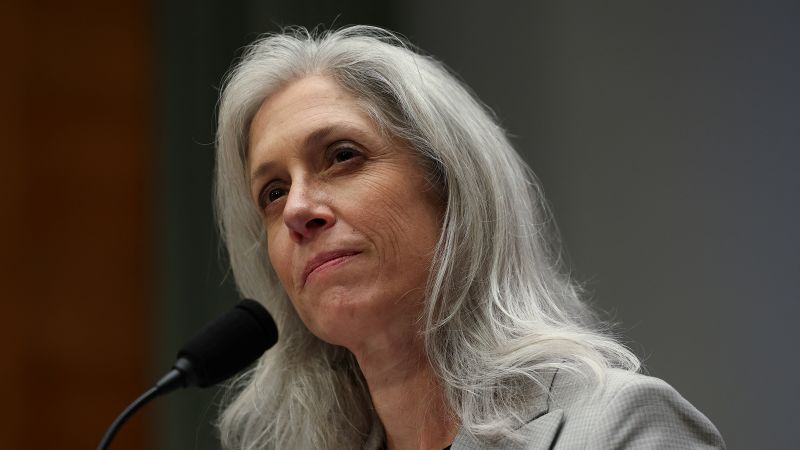US Health and Human Services Secretary Robert F. Kennedy Jr.’s recent move to replace a federal panel of vaccine advisers should help restore Americans’ trust in the US Centers for Disease Control and Prevention, the nominee to lead that agency told senators on Wednesday.
Dr. Susan Monarez, President Donald Trump’s pick for CDC director, testified before the Senate Health, Education, Labor and Pensions Committee amid increasing alarm from lawmakers about Americans’ eroding confidence in vaccine safety under Kennedy’s leadership of HHS.
The Senate hearing happened the same morning that the CDC’s newly appointed Advisory Committee on Immunization Practices convened its first meeting in Atlanta despite calls from lawmakers, including HELP Chairman Bill Cassidy, a Republican from Louisiana, to postpone the meeting.
“The secretary had to make a decision related to ensuring that the ACIP could be supportive of restoring public trust,” Monarez said when asked about the reassembled panel.
Kennedy dismissed all 17 ACIP members this month, citing conflicts of interest. Two days later, he named eight new members, several of whom had records of criticizing vaccine safety. As of Wednesday morning, one nominee, Dr. Michael Ross, had withdrawn during a federal review of members’ financial holdings.
Monarez, a microbiologist and infectious disease expert who has served across several federal health agencies over the years, said she was not familiar with the details of the shakeup but would be open to placing more people on the committee. Although the CDC director can recommend experts to join ACIP, the HHS secretary ultimately signs off on appointments.
“These are not easy positions to fill,” Monarez said. “It takes a lot of time commitment from some of these highly trained technical experts to want to participate.”
Cassidy and several Democratic senators sought reassurances from Monarez that she would protect ACIP’s integrity as CDC director.
“Part of the concern is that the people on the panel, although scientifically credentialed, no one has the experience of [an] immunization [background] to say, ‘Wait a second: The evidence that you’re presenting, there’s a lot more evidence to say it’s not true.’ That responsibility will fall on you,” Cassidy said, echoing concerns that he shared about the panel Monday and pointing to a specific presentation, slated for Thursday, on the preservative thimerosal in certain vaccines.
Cassidy also brought up mRNA, the technology in widely used Covid-19 vaccines that has early promise in other immunizations and potential therapies. Some vaccine critics, including new ACIP member Dr. Robert Malone, have touted unproven theories that mRNA vaccines can cause cancer and other serious side effects.
“If we turn our back on that platform, we’re turning our back on solutions to Lyme disease, which is terribly debilitating, to HIV, which is a scourge,” Cassidy said. He pressed Monarez to include experts on the ACIP panel who have experience with mRNA and immunology.
She agreed.
“We absolutely need highly trained scientists and professionals to be able to participate,” Monarez said. ACIP “is such a vital part of the CDC. It’s such a vital, vital process.”
The nominee also said several times that “vaccines save lives.”
At other points during the hearing, Monarez distanced herself from other Trump administration directives, including mass layoffs at the CDC and proposals to eliminate certain programs.
Monarez, who served as the CDC’s deputy director from January to March and later as acting director, said repeatedly that she was not familiar with the details of layoffs that stalled lead poisoning prevention efforts or anti-tobacco education campaigns.
Monarez said she was not involved in personnel decisionmaking during those Department of Government Efficiency-led layoff, though she later said she worked with CDC staff to “make sure we were reinforcing” the reduction in force plans.
Kennedy has been critical of the addition of fluoride to public water supplies, but Monarez was more noncommittal when questioned by Maryland Sen. Angela Alsobrooks, a Democrat, about the HHS secretary’s plans to end CDC support of fluoridation in state and local drinking water.
“Fluoride is an important component to oral health,” Monarez said.
Alsobrooks noted that the public water supply in Potomac, Maryland, where Monarez lives, is fluoridated and asked Monarez whether it is safe.
“I believe the water in Potomac, Maryland, is safe,” Monarez replied.
Trump chose Monarez to lead the agency after withdrawing his first nominee, former Florida congressman Dr. Dave Weldon, from consideration. In a public letter after his withdrawal, Weldon accused Cassidy and Sen. Susan Collins of Maine of cratering his nomination amid concerns over his vaccine views.

